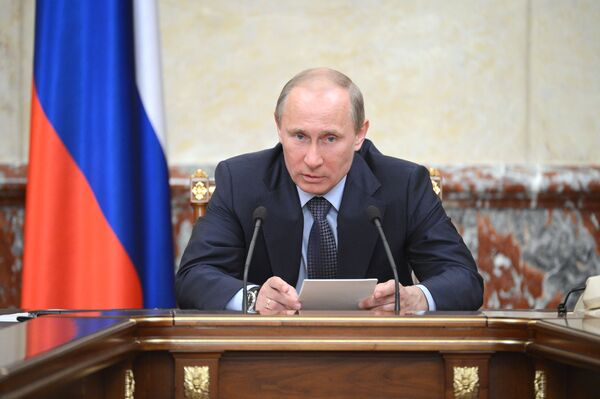Russian prime minister and president-elect Vladimir Putin ordered his government on Thursday to work out a road map and ensure necessary funding to fulfill his electoral promises.
“We need to begin working to implement the goals that have been stated… in my articles,” Putin told his ministers in Moscow.
In a series of articles published in Russian newspapers during his successful election campaign, Putin promised, among other things, to maintain economic stability, increase public salaries, develop social programs and strengthen the country’s defenses.
Putin ordered ministers on Thursday to take his plans into account while drafting the state budget for the next three years.
“All our proposals… in economy, the social sphere, infrastructure and the defense sphere should be guaranteed sufficient financial resources,” he said.
At the same time, he said, it is necessary to “carry out responsible budget policies” to ensure macroeconomic stability.
“I would like to stress…although we will have to spend quite a lot of resources to implement these goals… we will give absolute priority to our macroeconomic indicators,” the premier said.
In order to implement economic and social reforms and ensure a “new quality” of life for Russian citizens, it is necessary to redirect government funds away from non-priority spheres and stop wasting budget money, he said.
“We just need to use state resources carefully,” he added.
Putin’s orders are in line with what the Russian authorities call a “budget maneuver,” Vladimir Klimanov from the Moscow-based Institute for Public Finance Reform said. The term is used to describe a policy of “providing additional public services and implementing additional programs without seeking extra funds," he explained.
“Our ‘budget maneuver’ is quite limited,” Klimanov said. The government “already has a lot of budget obligations backed by both legislative and political guarantees,” he said, and getting rid of those obligations “would be painful for some groups of citizens and require certain legislative work.”
It is unclear, therefore, whether Putin will be able to fulfill his promises “promptly and easily,” especially in the face of a “new wave of global crisis,” he said.
Some of the premier’s promises are not planned to be realized before the end of his six-year presidential term in 2018, the analyst said.
“As for the redirection of funds from some programs to others – it will not be easy to establish those “non-priority” spheres that Putin is talking about because if you look at his articles, you will find almost all spheres of life mentioned there [as priority],” Klimanov added.
Vladimir Ivanov, the head of the EastWest Institute’s Russian branch, said he believed the success of Putin’s plans would depend on oil prices. If they drop below $100, the future president may face problems while implementing his ambitious social and defense programs, he said.
The Fitch ratings agency has estimated Putin's pledges to cost about $160 billion over six years, while state-owned Sberbank put the figure even higher at 5.1 trillion rubles, or $173 billion.
Meanwhile, the state-run VTsIOM pollster published a survey earlier this week showing that more than half of Russians (52 percent) do not remember what Putin promised ahead of the March 4 presidential vote.
According to the poll, only 37 percent of Russians believe Putin will be able to fulfill his promises. Another 41 percent believe he will implement only some of his plans, with another 15 percent being pessimistic about the future president’s ability to live up to any of his promises. The poll involved 1,600 residents in 46 Russian regions, with the margin of error not exceeding 3.4 percentage points.


